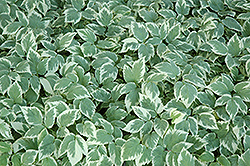>> Home
Variegated Bishop's Goutweed
Aegopodium podagraria 'Variegata'
Height: 12 inches
Spread: 4 feet
Sunlight:
![]()
![]()
![]()
Hardiness Zone: 1a
Description:
Probably the most durable groundcover of them all; quite stunning, low-growing plant with white variegated foliage; incredibly invasive and will spread indefinitely if not restrained, best used in totally contained areas or around mature trees
Ornamental Features
Variegated Bishop's Goutweed's attractive compound leaves remain green in colour with showy white variegation throughout the season on a plant with a spreading habit of growth.
Landscape Attributes
Variegated Bishop's Goutweed is an herbaceous perennial with a ground-hugging habit of growth. Its medium texture blends into the garden, but can always be balanced by a couple of finer or coarser plants for an effective composition.
This is a high maintenance plant that will require regular care and upkeep, and can be pruned at anytime. Gardeners should be aware of the following characteristic(s) that may warrant special consideration;
- Invasive
Variegated Bishop's Goutweed is recommended for the following landscape applications;
- Groundcover
Planting & Growing
Variegated Bishop's Goutweed will grow to be about 12 inches tall at maturity, with a spread of 4 feet. Its foliage tends to remain dense right to the ground, not requiring facer plants in front. It grows at a fast rate, and under ideal conditions can be expected to live for approximately 25 years. As an herbaceous perennial, this plant will usually die back to the crown each winter, and will regrow from the base each spring. Be careful not to disturb the crown in late winter when it may not be readily seen!
This plant performs well in both full sun and full shade. It is an amazingly adaptable plant, tolerating both dry conditions and even some standing water. It is not particular as to soil type or pH, and is able to handle environmental salt. It is highly tolerant of urban pollution and will even thrive in inner city environments. This is a selected variety of a species not originally from North America. It can be propagated by division; however, as a cultivated variety, be aware that it may be subject to certain restrictions or prohibitions on propagation.

